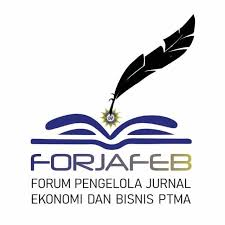The Tax Avoidance Practice of Indonesian Mining Companies
DOI:
https://doi.org/10.32534/jpk.v11i2.5745Keywords:
Intensitas Persediaan, Kapitalisasi Skala Rendah, Kepemilikan Institusional, Penghindaran Pajak, ProfitabilitasAbstract
The mining sector in Indonesia is one of the most significant contributors to state revenue through taxation. The mining industry contributed 33.431 trillion in the first semester of 2019. Although the amount seems significant, it would be bigger if mining companies did not avoid paying taxes. This research aims to analyze the role of institutional ownership in moderating the influence of profitability, thin capitalization, and inventory intensity on tax avoidance. This research uses MRA to analyze data on mining companies listed on the IDX from 2018 -2022. Data was collected from the population using purposive sampling to produce 60 samples. The research results show that profitability and thin capitalization variables impact tax avoidance, while inventory intensity differs. Institutional ownership moderates the impact of low profitability and thin capitalization on tax avoidance. However, there is no proof that this lessens the effect of inventory intensity on tax avoidance. By choosing a group of variables that affect tax avoidance, this study fills a knowledge gap in the influence of institutional ownership as a moderating variable. Future research can replicate this research by expanding the industry that is the object of research, extending the period, and using different analysis tools.
Downloads
References
Ahlemann, F., Bode, C., Brühl, R., Büschken, J., Dobusch, L., Elsas, R., Florysiak, D., Friedl, G., Güttel, W., Hofmann, C., Hutter, K., Johanning, L., Kaiser, S., Kieser, A., Kliewer, N., Zu Knyphausen-Aufseß, D., Köszegi, S. T., Kozica, A., Kretschmer, T., Zwick, T. (2017). Measuring Corporate Tax Avoidance – An Analysis of Different Measures. Junior Management Science, 3, 43–60. https://doi.org/10.5282/jums/v2i2pp43-60
Al Amin, M. (2018). Filsafat Teori Akuntansi. Unimma Press.
Andhari, & Sukartha. (2017). Pengaruh Pengungkapan Corporate Social Responsibility, Profitabilitas, Inventory Intensity, Capital Intensity dan Leverage Pada Agresivitas Pajak. E-Jurnal Akuntansi Universitas Udayana, 18(3), 2115–2142. Retrieved from https://ojs.unud.ac.id/index.php/akuntansi/article/view/25794
Anindyka, D., Pratomo, D., & Kurnia. (2018). Pengaruh Leverage (DAR), Capital Intensity dan Inventory Intensity Terhadap Tax Avoidance (Studi Pada Perusahaan Makanan Dan Minuman di BEI Tahun 2011-2015. E-Proceeding of Management, 5(1), 1–7. Retrieved from https://openlibrarypublications.telkomuniversity.ac.id/index.php/management/article/view/6290
Arianandini, P. W., & Ramantha, I. W. (2018). Pengaruh Profitabilitas, Leverage, dan Kepemilikan Institusional Pada Tax Avoidance. E-Jurnal Akuntansi, 2088. https://doi.org/10.24843/eja.2018.v22.i03.p17
Arianti, B. F. (2020). The Effect of Independent Commissioner’s Moderation of CSR and Institutional Ownership on Tax Avoidance. JABE (JOURNAL OF ACCOUNTING AND BUSINESS EDUCATION), 4(2), 98-110. https://doi.org/10.26675/jabe.v4i2.8271
Astuti, T. P., & Aryani, Y. A. (2016). Tren Pengindaran Pajak Perusahaan Manufaktur di Indonesia Yang Terdaftar di BEI Tahun 2011-2014. Jurnal AKunansi, 20(3), 375–388. https://doi.org/10.24912/ja.v20i3.4
Bachmann, C., Baumann, M., & Richter, K. (2018). The effects on investment incentives of an allowance for corporate equity tax system: the Belgian case as an example. Review of Quantitative Finance and Accounting, 51(4), 943–965. https://doi.org/10.1007/s11156-017-0693-2
Cahyani, A. Z., Djaddang, S., & Sihite, M. (2021). FAKTOR-FAKTOR YANG MEMPENGARUHI TAX AVOIDANCE DENGAN KEPEMILIKAN INSTITUSIONAL SEBAGAI VARIABEL MODERASI. KRISNA: Kumpulan Riset Akuntansi, 13(1), 122–135. https://doi.org/10.22225/kr.13.1.2021.122-135
Carolina, V., & Vinny, O. (2021). Tax Avoidance, Tax Reproting, Aggeresivenss, Tax Risk & Corporate Risk. Riset Akunansi dan Keuangan Indonesia, 6(1), 1–8. https://doi.org/10.23917/reaksi.v6i1.13315
Darsani, P. A., & Sukartha, I. M. (2021). The Effect of Institutional Ownership, Profitability, Leverage and Capital Intensity Ratio on Tax Avoidance. In American Journal of Humanities and Social Sciences Research 5(1), 13-22. Retrieved from https://www.ajhssr.com/wp-content/uploads/2021/01/C215011322.pdf
Falbo, D., & Firmansyah, A. (2018). Thin Capitalization, Transfer Pricing Aggresiveness, Penghindaran Pajak. In Indonesian Journal of Accounting and Governance, 2(1), 1-28. https://doi.org/10.36766/ijag.v2i1.11
Direktorat Jenderal Pajak. (2023). Laporan Kinerja Direktorat Jenderal Pajak 2023.
Dwiyanti, I. A. I., & Jati, I. K. (2019). Pengaruh Profitabilitas, Capital Intensity, dan Inventory Intensity pada Penghindaran Pajak. E-Jurnal Akuntansi, 27(3), 2293-2321. https://doi.org/10.24843/eja.2019.v27.i03.p24
Dyreng, S. D., Hanlon, M., & Maydew, E. L. (2010). The effects of executives on corporate tax avoidance. Accounting Review, 85(4), 1163–1189. https://doi.org/10.2308/accr.2010.85.4.1163
Prasatya, R. E., Mulyadi, J., & Suyanto, S. (2020). Karakter Eksekutif, Profitabilitas, Leverage, dan Komisaris Independen Terhadap Tax Avoidance Dengan Kepemilikan Institusional Sebagai Variabel Moderasi. JRAP (Jurnal Riset Akuntansi Dan Perpajakan), 7(2), 153-162. https://doi.org/10.35838/jrap.2020.007.02.13.
Kimsen., Eksandy, A., & Erisa, Y. (2018). PENGARUH RETURN ON ASSETS, KOMITE AUDIT DAN LEVERAGE TERHADAP PENGHINDARAN PAJAK (TAX AVOIDANCE) (Studi pada Perusahaan Jasa Sub Sektor Perdagangan Besar yang Terdaftar di Bursa Efek Indonesia Periode 2012-2016). Competitive: Jurnal Akuntansi dan Keuangan. 2(2), 1-12. http://dx.doi.org/10.31000/competitive.v2i2.908
Eskandar, H., & Ebrahimi, P. (2020). Tax Avoidance and Institutional Ownership: Active vs. Passive Ownership. In International Journal of Finance and Managerial Accounting, 5(17), 95-106. Retrieved from http://www.ijfma.ir/article_15977_24c43619ac42ca6b57ee5b85657ecc60.pdf
Haryanti, A. D. (2019). PENGARUH CORPORATE GOVERNANCE TERHADAP TAX AVOIDANCE (Studi pada Perusahaan Manufaktur yang Terdaftar di BEI Tahun 2017), Jurnal Akademisi Akuntansi (JAA), 2(1), 36-49. https://doi.org/10.22219/jaa.v2i1.8210
IMF. (2023). Indonesia: 2023 Article IV Consultation-Press Release; Staff Report; and Statement by the Executive Director for Indonesia; IMF Country Report No. 23/221; May 5, 2023.
Irmaslian, C., Dewi, V. S., & Waharini, F. M. (2021, October 7). Tax Avoidance Practices: Is it Only Affected by Financial Performance?. Proceedings of the 2nd Borobudur International Symposium on Humanities and Social Sciences. https://doi.org/10.4108/eai.18-11-2020.2311734
Indrawan, D. A., Nuraini, M., Wulan, S. S., Sururi, U. T. & Mulyati, T. (2016). FACTORS AFFECT TAX AVOIDANCE (EMPIRICAL STUDY ON THE MINING SECTOR AND COMPONENT LISTED IN THE INDONESIA STOCK EXCHANGE FACTORS AFFECT TAX AVOIDANCE (EMPIRICAL STUDY ON THE MINING SECTOR AND COMPONENT LISTED IN THE INDONESIA STOCK EXCHANGE THROUGHOUT 2016-2019). Turkish Journal of Physiotherapy and Rehabilitation, 32(3). Retrieved from https://www.academia.edu/73777119/Factors_Affect_Tax_Avoidance_Empirical_Study_on_the_Mining_Sector_and_Component_Listed_in_the_Indonesia_Stock_Exchange_Throughout_2016_2019_
Ismi, F. (2016). Pengaruh Thin Capitalization, Return on Asset, dan Corporate Pada Perusahaan Jakarta Islami Indeks (JII). In Jurnal Ilmiah Mahasiswa Ekonomi Akuntansi (JIMEKA), 1(2), 150-165 Retrieved from http://www.jim.unsyiah.ac.id/EKA/article/view/1025.
Jensen, M. C., & Meckling, W. H. (1976). Theory of the firm: Managerial behavior, agency costs and ownership structure. Journal of Financial Economics, 3(4), 305–360. Retrieved from https://www.sfu.ca/~wainwrig/Econ400/jensen-meckling.pdf
Jumailah, V. (2020). Pengaruh Thin Capitalization dan Konservatisme Akuntansi terhadap Tax Avoidance dengan Kepemilikan Institusional sebagai Variabel Moderasi. Management & Accounting Expose, 3(1), 13–21. https://doi.org/10.36441/mae.v3i1.132
Luthfiyyah. (2018). pengaruh koneksi politik, pertumbuhan penjualan, intensitas aset tetap, intensitas persediaan, dan intensitas modal terhadap tax avoidance pada perusahaan manufaktur yang terdaftar di bei tahun 2013 - 2016. E-Jurnal Economics and Business Faculty.
Malik, D. I. A. A., & Rachmat, R. A. H. (2023). The effect of institutional and managerial ownership on tax avoidance: an empirical study of coal subsector mining companies listed on the Indonesian stock exchange. Gema Wiralodra, 14(2), 755–765. https://doi.org/10.31943/gw.v14i2.486
Moeljono, M. (2020). Faktor-Faktor yang Mempengaruhi Penghindaran Pajak. Jurnal Penelitan Ekonomi Dan Bisnis, 5(1), 103–121. https://doi.org/10.33633/jpeb.v5i1.2645
Mulyana, Y., Mulyati, S., Umiyati, I., & Sutaatmadja, S. (2020). PENGARUH KOMISARIS INDEPENDEN, KOMPENSASI RUGI FISKAL DAN PERTUMBUHAN ASET TERHADAP PENGHINDARAN PAJAK. SIKAP, 4(2), 160–172. Retrieved from http://jurnal.usbypkp.ac.id/index.php/sikap
Nadhifah, M., & Arif, A. (2020). TRANSFER PRICING, THIN CAPITALIZATION, FINANCIAL DISTRESS, EARNING MANAGEMENT, DAN CAPITAL INTENSITY TERHADAP TAX AVOIDANCE DIMODERASI OLEH SALES GROWTH. Jurnal Magister Akuntansi Trisakti, 7(2), 145–170. https://doi.org/10.25105/jmat.v7il.6311
Ngadiman, & Puspitasari. (2017). PENGARUH LEVERAGE, KEPEMILIKAN INSTITUSIONAL, DAN. Jurnal Akuntansi, 18(3), 408–421. https://doi.org/10.24912/ja.v18i3.273
Oktamawati, M. (2017). Pengaruh Karakteristik Eksekutif, Komite Audit, Ukuran Perusahaan, Leverage, Pertumbuhan Penjualan, dan Profitabilitas Terhadap Tax Avoidance. Jurnal Akuntansi Bisnis, 15(1), 2541–5204. https://doi.org/10.24167/jab.v15i1.1349
Olivia, I., & Dwimulyani, S. (2019). Pengaruh Thin Capitalization dan Profitabilitas Terhadap Penghindaran Pajak dengan Kepemilikan Institusional Sebagai Variabel Moderasi. Prosiding Seminar Nasional Pakar ke 2 Tahun 2019. https://core.ac.uk/download/pdf/267902821.pdf
Pattiasina, V., Tammubua, M. H., Numberi, A., Patiran, A., & Temalagi, S. (2019). Capital Intensity and tax avoidance. International Journal of Social Sciences and Humanities, 3(1), 58–71. https://doi.org/10.29332/ijssh.v3n1.250
Prasetya, D. A. A., & Susilowati, C. (2024). Pengaruh Return On Asset , Corporate social Responbility dan Capital Intensity terhadap Tax Avoidaice. Jurnal Proaksi, 11(1), 90–101. https://doi.org/10.32534/jpk.v11i1.5474
Prasetyo, A., Masitoh, E., & Wijayanti, A. (2018). The Influence of Good Corporate Governance, Capital Intensity Ratio, and Profitability to Effective Tax Rate (Empirical Study on Manufacturing Companies Basic Industry Sectors and Chemicals Listed In Indonesia Stock Exchange Year 2011-2015). The 2nd International Conference on Technology, Education, and Social Science 2018 (The 2nd ICTESS 2018. Retrieved from https://ejurnal.unisri.ac.id/index.php/proictss/article/download/2198/1960
Prastiwi, D., & Ratnasari, R. (2019). The Influence of Thin Capitalization and The Executives’ Characteristics Toward Tax Avoidance by Manufacturers Registered on ISE in 2011-2015. AKRUAL: Jurnal Akuntansi, 10(2), 119-134. https://doi.org/10.26740/jaj.v10n2.p119-134
Pratama, I., & Suryarini, T. (2020). Accounting Analysis Journal The Role of Independent Commissioners in Moderating the Effect of Capital Intensity, Inventory Intensity, and Profitability on Tax Aggressiveness ARTICLE INFO ABSTRACT. Accounting Analysis Journal, 9(3), 208–214. https://doi.org/10.15294/aaj.v9i3.42687
Prismanitra, K. (2021). Accounting Analysis Journal The Determinants of Tax Avoidance with Good Corporate Governance as A Moderating Variable ARTICLE INFO ABSTRACT. Accounting Analysis Journal, 10(2), 101–107. https://doi.org/10.15294/aaj.v10i2.47342
Putra, A. S., & Zahroh, F. (2023). Analisis Determinan Tax Avoidance Pada Perusahaan Sub Sektor Farmasi. Jurnal Akademi Akuntansi, 6(2), 257–272. https://doi.org/10.22219/jaa.v6i2.26421
PWC. (2023). Mining in Indonesia: Investment, Taxation and Regulatory Guide 2023. Retrieved from www.pwc.com/id
Rachdianti, F. T., Astuti, E. S., & Susilo Hery. (2016). PENGARUH PENGGUNAAN E-TAX TERHADAP KEPATUHAN WAJIB PAJAK (Studi pada Wajib Pajak Terdaftar di Dinas Pendapatan Daerah Kota Malang). In Jurnal Perpajakan (JEJAK)|, 11(1).
Rahayu, D., & Rusliati, E. (2019). Kepemilikan Institusional, Kepemilikan Manajerial, dan ukuran Perusajaan terhadap Kebijakan Dividen. Jurnal Riset Akuntansi Kontemporer, 11(1), 41–47. https://doi.org/10.23969/jrak.v11i1.1870
Ritonga, J. C. (2019). Pengaruh Kompensasi Rugi Fiskal, Pertumbuhan Penjualan dan Intensitas Modal Terhadap Penghindaran Pajak Pada Perusahaan Manufaktur Yang Terdaftar di Bursa Efek Indonesia (BEI) Tahun 2014-2017. Universitas Islam Indonesia, 1, 22. Retrieved from http://hdl.handle.net/123456789/17868
Romadhina, A. P. (2019). THE EFFECT OF ADVERT LOADS AND INTENSITY OF SUPPLIES ON TAX AGRESIVITY. In Journal of Economic and Management Scienties, 5(1), 1-13. http://dx.doi.org/10.37034/jems.v5i1.6
Romario, R., & Rahmanto, B. T. (2023). Dampak Relativisme, Idealisme, Dan Cinta Uang Terhadap Persepsi Etis Penghindaran Pajak. Jurnal Proaksi, 10(2), 275–289. https://doi.org/10.32534/jpk.v10i2.4053
Rosandi, A. D. (2022). PENGARUH PROFITABILITAS, INVENTORY INTENSITY TERHADAP TAX AVOIDANCE DENGAN KEPEMILIKAN INSTITUSIONAL SEBAGAI PEMODERASI. Jurnal Akuntansi, 8(1), 19–35. http://dx.doi.org/10.35906/jurakun.v8i1.961
Salwah, S., & Herianti, E. (2019). PENGARUH AKTIVITAS THIN CAPITALIZATION TERHADAP PENGHINDARAN PAJAK. Jurnal Riset Bisnis, 3(1), 30-36. https://doi.org/10.35814/jrb.v3i1.978
Sigianto, D. (2019). Mengenal Soal Penghindaran Pajak Yang Dituduhkan ke Adaro. Detik Finance.
Simanjutak, J. (2017). Indonesia Masuk Peringkat ke-11 Penghindaran Pajak Perusahaan, Jepang No.3
Simorangkir, E. (2019). Penerimaan Pajak 2019 Meleset gara-gara Sektor Tambang Terpuruk. Detik Finance.
Sonia, S., & Suparmun, H. (2019). Factor Influensing Tax Avoidance. Advances in Economics, Business and Management Research, 73, 238–243. https://doi.org/10.2991/aicar-18.2019.52
Suwiknyo, E. (2021, August 2). Mayoritas Perusahaan Tambang Belum TransparanSoal Pajak. Bisnis.Com.
Tandean, V. A., & Winnie (2016). The Effect of Good Corporate Governance on Tax Avoidance: An Empirical Study on Manufacturing Companies Listed in IDX period 2010-2013. In Asian Journal of Accounting Research, 1 (1), 28-38. https://doi.org/10.1108/AJAR-2016-01-01-B004
Trisnawati, E., & Firmansyah, A. (2022). Mampukah Kepemilikan Institusional Mempengaruhi Tax Avoidance? E-Jurnal Akuntansi, 32(1), 3452–3467. https://doi.org/10.24843/EJA.2022.v
Utami, P. P., & Ernandi, H. (2021). Effect of Sales Growth, Profitability and Company Size on Tax Avoidance with Institutional Ownership as Moderating Variable. Academia Open, 5(1). https://doi.org/10.21070/acopen.5.2021.2285
Wardani, D. K., & Purwaningrum, R. (2018). PENGARUH KARAKTERISTIK PERUSAHAAN DAN CORPORATE SOCIAL RESPONSIBILITY TERHADAP PENGHINDARAN PAJAK. Jurnal Riset Akuntansi dan Keuangan (JRAK), 14(1), 1-13. Retrieved from http://download.garuda.kemdikbud.go.id/article.php?article=2437090&val=23305&title=PENGARUH%20KARAKTERISTIK%20PERUSAHAAN%20DAN%20CORPORATE%20SOCIAL%20RESPONSIBILITY%20TERHADAP%20PENGHINDARAN%20PAJAK
Watss, R. L., & Zimmerman, J. L. (1986). Positive Accounting Theory.
Winarto, W., & Daito, A. (2021). CAN THIN CAPITALIZATION AND TRANSFER PRICING ACTIVITIES REDUCE THE TAX BURDEN? Dinasti International Journal of Economic, Finance and Accounting, 2(1), 121–131. https://doi.org/10.38035/dijefa.v2i1
Wirawan, S. (2010). Pengaruh Struktur Corporate Governance, Kontrak Hutang, dan Political Cost Tehadap Manajemen Laba Pada Perusahaan Manufaktur Periode 2006-2009. Media Riset Akuntansi, Auditing, & Informasi, 10(3), 1-14. https://doi.org/https://doi.org/10.25105/mraai.v10i3.1032
Wulandari, D. S., & Cahyonowati, N. (2024). A Bibliometric Examination of Studies on Corporate Tax Avoidance Utilizing Vosviewer Software. Jurnal Proaksi, 11(2), 265–281. https://doi.org/10.32534/jpk.v11i2.5587
Yulianty, A., Krisnatika, maradela E., & Firmansyah, A. (2021). Penghindaran Pajak Pada Perusahaan Pertambangan Di Indonesia: Profitabilitas, Tata Kelola Perusahaan, Intensitas Persediaan, Leverage. Jurnal Pajak Indonesia, 5(1), 20–31. https://doi.org/10.31092/jpi.v5i1.1201
Yuliawati. (2022). Gelombang Penghindaran Pajak dalam Pusaran Batu Bara.
Yuni, N. P. A. I, & Setiawan, P. E. (2019). Pengaruh Corporate Governance dan Profitabilitas terhadap Penghindaran Pajak dengan Ukuran Perusahaan Sebagai Variabel Pemoderasi. E-Jurnal Akuntansi, 29(1), 128. https://doi.org/10.24843/eja.2019.v29.i01.p09
Downloads
Published
Issue
Section
License
Copyright (c) 2024 Lestari Adhi Widyowati, Inta Hartaningtyas Rani, Jara Hardiyanti Jalih

This work is licensed under a Creative Commons Attribution 4.0 International License.




















